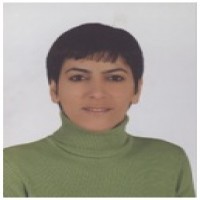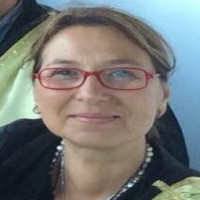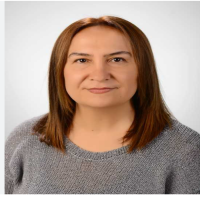Research Article
Issue Reviewers

Ayşe Müge Yazgan, Associate Professor, completed her primary, secondary and high school education at one of the prestigious school, T.E.D. in Turkey. She graduated from Ankara College. After graduating from Marmara University, Department of English Language Education, she started her master's degree in Linguistics in London and completed her thesis in Turkey.
First, she worked as Marmara University Atatürk Education Faculty, Foreign Languages Coordinator, Foreign Language Research and Application Center Founder. She assumed the role of coordinator. She is one of the founders of Continuing Education Center at the University. She has been working as an academic director of the Center at Marmara University, İstanbul Turkey since the Center was founded in 2001.
In 2011, she started his doctorate at one prestigious University of Marmara, Faculty of Communication, Head Department of Public Relations and Publicity, Department of Interpersonal Communication. She completed her research on "The Reflection of Interpersonal Communication on Family Relationships" under the consultancy of Prof. Dr. Ebru ÖZGEN and received Doctorate title on March 29, 2017, and Associate Professor Title on April 18, 2022. Among the working areas; The Case of Women in the Media, Family Relations, Bride Children, Art of Conversation with Correct Word Choices, Empathic Tendencies of Academics, Consumption Culture, Helicopter Parents, Health Communication. She has publications in national and international journals and has published three books. She was invited to the Congress in Singapore and Athens, Greece in 2018. She was a keynote speaker at the Congress in Dubai in 2021.
She still gives lectures on "Studies of Media", "Crisis Communication Management", "Crisis Communication Management", "Public Relations" and "Effective Communication Skills", "Interpersonal Communication" and "Interpersonal Relations" at Marmara University.


Emel Coşkun
Duzce University, Department of Sociology
Konuralp Yerleskesi 81620 Duzce TURKEY
E: emelcoskun1@gmail.com / emelcoskun@duzce.edu.tr
P: +90(380)5421100 (3973)
CURRENT POSITION
Dec. 2019 – present Associate Professor in Sociology Dept. Duzce Univ. (Turkey)
January 2015 – Dec. 2019 Assistant Professor in Sociology Dept. Duzce Univ. (Turkey)
RESEARCH INTERESTS
Sociology of migration, gender in current migration flows in Turkey; undocumented, asylum seeker and refugee women; gendered division of migrant labour; human trafficking in women; regional and national migration politics; social work with refugees; prostitution regimes and politics; research ethics.
TEACHING
Undergraduate courses (2016-2021): Sociology of gender, sociology of migration, qualitative research methodology, sociology of economics.
Graduate courses (2017-2021): Gender and migration studies, migration theories, migration policy, qualitative research methodology.
EDUCATION
2014, Ph.D. in Migration Studies, University of Kent (UK)
Title: Policy and Practice against Sex-trafficking, A Case Study: Turkey (Sup. Dr. Lucy Williams, Dr. Lavinia Mitton)
2005, M.A. in Development Economics, Marmara University (Turkey)
Title: Economic Contributions of Female Migrants in Western European Countries
1999, B.A. in Economics Istanbul University (Turkey)
ACADEMIC VISIT
June - Sept 2017. Visiting Researcher at Centre on Migration, Policy and Society (COMPAS), the University of Oxford, UK.
June - July 2016. Visiting Researcher at Centre on Migration, Policy and Society (COMPAS), the University of Oxford, UK.
PUBLICATIONS
Williams, L., Kaska, S. and Coskun, E. (Eds). (2020). Women, Migration and Asylum in Turkey: Developing Gender Sensitivity in Migration, Research and Practice. London: Palgrave Macmillan
Coşkun, E. and Sarıalioğlu, Ö. (2020). Kentin Ötekileri olarak Sahra-altı Afrikalı Göçmenler: Kumkapı Örneği. In Göç ve Kent: Etkileşimler, Y. Ahi, M.N.Gültekin and M. Açıkgöz (eds). Ankara: Nika, pp.73-99.
Coşkun, E. (2020). Institutional Blind Spots’ in Turkey’s Policy Against the Trafficking of Women, in Women, Migration and Asylum in Turkey: Developing Gender Sensitivity in Migration, Research and Practice. Williams, L., Kaska, S. and Coskun, E. (Eds). London: Palgrave Macmillan. Pp.147-167.
Coskun, E. and Eski, B. (2020). Gender in the Turkish Asylum Process, in Women, Migration and Asylum in Turkey: Developing Gender Sensitivity in Migration, Research and Practice. Williams, L., Kaska, S. and Coskun, E. (Eds). London: Palgrave Macmillan. Pp.103-122.
Coşkun, E. , Sarıalioğlu, Ö. and, Dinçer, C. G. (2020). "Göç Araştırmalarında Söylem, Yöntem ve Etik: FeministBir Yöntem Mümkün Mü?". Fe Dergi 12: 70-81
Coskun, E. and Eski, B. (2019). Erkek şiddetinden kaçarken... Türkiye'de kadın ve LGBTİ+ sığınmacılar (Escaping from male violence… Women and LGBTI+ asylum seekers in Turkey). Istanbul: Sosyal Arastirmalar Vakfi.
Coskun, E. (2018). Criminalisation and prostitution of migrant women in Turkey: A case study of Ugandan women. Women's Studies International Forum. 68, May–June 2018, pp. 85-93.
Coskun, E. and Yılmaz, Ç. (2018) Sığınmacıların Toplumsal Uyum Sorunları ve Sosyal Hizmetlere Erişimi: Düzce Uydu Kent Örneği (Asylum Seekers’ Social Integration Problems and Access to Social Services: A Case of Düzce Satellite City). Sosyal Siyaset Konferansları Dergisi. 75: 269–305. DOI: 10.26650/jspc.2018.75.0016
Coskun, E. (2017). Sosyal Hizmetin Kapsamadıkları: Kağıtsız Göçmen Kadınlar. Sosyal Hizmetlerde Güncel Tartışmalar: Sosyal Hizmet(ler)i Yeniden Düşünmek Konferansları İçinde. N. Şahin Taşgın, U. Tekin ve Y. Ahi. Ankara: Nika Yayınevi. ss. 217-233.
- (2017). Gender, Migration And Prostitution In Turkey. Sergey V. Ryazantsev (ed). In Female Migration: Forms, Trends, Consequences Volume 3, No. 1. Moscow: The Russian Academy Of Sciences Institute Of Socio-Political Research Center For Social Demography. pp. 75-86
- (2017). “Undocumented Migrant Women in Turkey: Legislation, Labour and Sexual Exploitation”, M. Murat Yüceşahin ve Pınar Yazgan (ed.) In Revisiting Gender and Migration. London: Transnational Press London. pp. 75-88.
- (2017) “Fuhşa giden yolda kâğıtsız göçmen kadınlar” (Routes into Prostitution: Undocumented Migrant Women). Toplum ve Bilim Dergisi. 141. pp.194-220.
- (2017) “Türkiye’de Kağıtsız Göçmen Kadınlar ve Sosyal Hizmetler" (Undocumented Migrant Women and Social Work in Turkey). Çalışma ve Toplum. 2017/3. pp.1299-1316.
- (14 July 2016). Sophie's journey: three countries, three stories, same abuse. Open Democracy. (Online) https://www.opendemocracy.net/beyondslavery/emel-coskun/sophies-journey-three-countries-three-stories-same-abuse
- (2016). Consent' issue in sex trafficking and evidences from Turkey. Social Politics. Vol. 23 (3): 437-458.
- (2016). Türkiye'nin göç rejiminde toplumsal cinsiyet faktörü: Ugandalı göçmen kadınlar örneği [Gender factor in Turkey’s migration regime: A case of Ugandan migrant women]. Fe Dergi. Vol.8, no.1, 91-104.
- (2016). Bunların gerçek olduğuna inanmıyor musunuz? Araştırma etiğine dair 'yukarıdan' notlar..." [Don't you believe that these are true? Notes from 'up' on research ethics] in Etnografik Hikayeler [Ethnographic Stories], Z. Nilüfer Nahya and Rabia Narmanşah (Eds). Istanbul: Metis Yayinevi.
- (2015). Curbing sex trafficking in Turkey: the policy-practice divide. The Asian and Pacific Migration Journal (APMJ). Vol. 24(3) 327-352.
- (2014). Türkiye'de Göçmen Kadınlar ve Seks Ticareti Migrant Women and Sex Trafficking in Turkey. Çalışma ve Toplum. 42:185-206.
Coskun, E. and Senses, N. (2012). "Non-Governmental Organizations: Migrant Associations, Associations, Foundations and Other Organisations that Work for Migrants". In Irregular Labour Migration In Turkey And Situation Of Migrant Workers In The Labour Market. Toksoz, G., Erdogdu, S. and Kaska, S. (Eds). International Organisation for Migration (IOM). Policy Paper No. 3072: 111-125.
PRESENTATIONS
Coskun, E. (2020). Women, Migration and Asylum in Turkey: Developing Gender-Sensitivity in Migration Research, Policy and Practice, Online Seminar, organised by University of Kent, Brussels School of International Studies. 25 Nov. 2020.
Coskun, E. (2018). Silenced and Undocumented: Gender effects in Forced Migration in
Turkey. Presented at IASFM 17: Whither Refugees? Restrictionism, Crises and Precarity Writ Large, Thessaloniki, Greece. 24-27 July 2018.
Coskun, E. (2017). “Gendered Effects of Turkey’s Asylum/Refugee Regime”. Development Studies Association (DSA) 2017: Sustainability Interrogated: Societies, Growth, and Social Justice. Bradford University, United Kingdom. 6-8 September 2017.
“Gendered Effects of Turkey’s Asylum/Refugee Regime”. Turkish Migration Conference 2017, Harokopio University, Athens, Greece. 23-26 August 2017.
“Women in Turkey's Migration Regime: Ugandan Women in Kumkapı”. Turkish Migration Conference 2016 University of Vienna, Austria. 13 July 2016.
"Gender, Race And Migration In Turkey: A Case Study Of Kumkapı” Kyambogo University International Multi-Disciplinary Conference 2016. Kampala, Uganda. 29-31 January 2016.
"Policy and Practice against Sex Trafficking in Turkey". Migration, Gender and Health Symposium, 5-6 November 2015. Marmara University, Istanbul. Turkey.
"Policy and Practice against Sex Trafficking in Turkey". 15th International Conference of "Migration and Gender”, Dudelange, Luxemburg. 18 June 2015.
“Migrant organisations and migrant supporting organisations in Turkey”. International Workshop on Labour Rights as Human Rights; Migration, Citizenship and Mobilisation of Civil Society in Turkey and Sweden. REMESO, Linköping University (Sweden) and Ankara University (Turkey). Swedish Consulate. Istanbul, Turkey. April 2013.
RESEARCH
June 2021 – Cont. Aşk mı Hayatta Kalma Mücadelesi mi? Türkiye’de Sınır-Ötesi Evliliklerde Göçmen Kadınlar (Love or Struggle for Survival? Migrant Women in Cross-Border Marriages in Turkey) TUBITAK-1002 funded research project.
July 2017 - July 2018. “Evaluation of Social Integration of Asylum Seekers And Refugees In Duzce ”. Funded by the Scientific Research Projects Unit of Duzce University. Conducted together with Dr. Çetin Yılmaz.
June-December 2017. “Gendered Effects of Turkey’s Asylum/Refugee Regime”. Funded by Raul Wallenberg Institute, Istanbul. Conducted together with Beril Eski.
July 2016 and June-September 2017. Visiting Researcher at the Institute of Social and Cultural Anthropology and the Centre on Migration, Policy and Society (COMPAS), the University of Oxford.
July 2015 - July 2016. “Migrant women in migration and prostitution regimes in Turkey: A Case Study of Kumkapı”. Funded by the Scientific Research Projects Unit of Duzce University.
May 2011-Oct. 2012. "Irregular Labour Migration and Employment in Turkey”. Researcher Assistant under the provision of Assoc. Prof. Selmin Kaska (Marmara Univ.). Research Coordinator: Prof. Gülay Toksöz (Ankara Univ.) Publisher/Funding body: International Organisation for Migration (IOM).
GRANTS
2017-18 – Research Grant from the Department of Scientific Research Projects, Duzce University, Turkey.
2017 (June-Sept.) – Post-Doctoral Research Scholarship, TUBITAK (2219), The Scientific and Technological Research Council of Turkey.
2016 – Research Grant from the Department of Scientific Research Projects of Duzce University, Turkey.
2016 - Publication in International Journals Award, Duzce University.
2008-2012 Overseas Research Student Awards Scheme (ORSAS), University of Kent, UK.
1967 Fethiye doğumlu olan Gülseren Şendur Atabek, Akdeniz Üniversitesi İletişim Fakültesi, Radyo, Televizyon ve Sinema Bölümü’nde profesördür. Akademik yaşamına araştırma görevlisi olarak 1994 yılında Gazi Üniversitesi İletişim Fakültesi’nde başlamıştır. Lisans derecesini Dokuz Eylül Üniversitesi’nde, yüksek lisans ve doktora derecelerini ise Ankara Üniversitesi’nde alan Şendur Atabek’in doçentlik derecesi iletişim bilimleri alanındadır. Medya Metinlerini Çözümlemek (2007) ve Türk Romanında Gazeteciler (2008) adlı kitapların yazarı olan Şendur Atabek’in ayrıca, temel ilgi alanı olan medya tarihi, medya analizi ve görsel iletişim konularında çeşitli makale ve çevirileri bulunmaktadır.





 Web
Web

Kurum Bilgileri: Sanat Ve Tasarım Fakültesi, Yeni Medya Ve İletişim Araştırma Alanları: Sosyal ve Beşeri Bilimler



Aim & Scope
Mediterranean Journal of GWS - a periodical which includes interdisciplinary conceptual, empirical and methodological discussions - aims at developing dialogs among researchers from various disciplines and producing and popularizing current discussions in the field and making them accessible.
Mediterranean Journal of Gender and Women’s Studies (KTC) is published biannually in May and November as a peer-reviewed international electronic journal. It welcomes empirical studies and compilations prepared from the perspective of women and gender among all disciplines relating to women and gender issues particularly sociology, psychology, anthropology, communications, history, economics, education, business administration, law, health sciences and political science.
Author Guidelines
Mediterranean Journal of Gender and Women's Studies is dedicated to publishing unique interdisciplinary studies designed with women, gender and feminist perspectives. The content of the journal is created as the publications that complete the editorial process are published in full-text on-line on the internet which is subject to the General Public License.
The work to be submitted to the Mediterranean journal of Gender and Women's Studies should not have been published in any other media/elsewhere. In order for the submitted full texts to be taken into the evaluation process, it is necessary to include titles, English / Turkish abstracts, and references. The full text of the works and texts should consist of a maximum of 10,000 words, including abstracts, tables / figures, references and text content. It would be appropriate for the work to be monitored in the following order:
Title, Author Information (Name, Surname, the Organization where s/he works for, Contact Information), Abstract, Key Words, English Title, Abstract, Keywords, Introduction, Main Text, Method, Findings, Discussion, Conclusion, References, Writer's Note.
Articles must be prepared in Microsoft Word format. It is necessary to leave margins of 3 cm from the left, 2.5 cm from the top, and 2 cm from the right and bottom of the page structure.
The top and bottom headings of the article should be formatted in 12 point Times New Roman in bold. The heading of the work should be at the beginning of the abstract in Turkish and English on the first page of the full text. Headlines can be at most 40 words long. Regardless of the language used, the abstract must consist of at least 150 and at most 250 words. A min. of 3 and a max. of 5 keywords that indicate the quality of the article should be specified in the abstract.
In the articles that will apply to the GWS journal, there should be an extended summary of at least 500 words in English (Turkish for articles written in English) on the purpose, method, finding and result of the study. Care should be taken that the extended abstracts are not the same as the abstract in the second language of the article.
Except for the headings, the text content of the article should be in 12 point Times New Roman font. The text should be set to 1.5 cm line spacing and one space (2 cm) should be left between the paragraphs. The first lines of the paragraphs should be indented 1.27 cm from the left
Visual contents such as tables, figures, pictures and graphics should be included in the text.
The references page lists only the sources cited in the article. Every reference list entry should have at least one corresponding in-text citation in the American Psychological Association (APA) style. Further information on providing reference can be obtained from the APA Publication Manual.
Ethical Principles and Publication Policy
Click here for Copyright Transfer and the Conflict of Interest Forms.
On the behalf of all authors, the corresponding author:
- The article submitted is the original work of author(s);
- All authors participated in the work in an individual way and are prepared to take all kinds of the responsibilities for the work;
- In the submitted article, all authors are authorized to transfer all the financial rights of them related to the article to KTC Journal and make commitments in the form, therefore they will be responsible for all disputes that have occurred and that may occur;
- All authors have seen and approved the submitted article’s latest form.
- E-mail and street addresses of all authors have been entered into the Dergipark System correctly.
- The article has not been published and is not being submitted or considered for publication elsewhere;
- The text, illustrations, and any other materials included in the article do not infringe upon any existing copyright or other rights of anyone.
- S/he accepts and undertakes that his/her financial rights on the submitted article, in particular all public transmission rights including processing, reproduction, representation, printing, distribution, and online transmittal are transmitted to KTC Journal for unlimited use.
Notwithstanding the above, the author(s) retain(s) intellectual property rights such as:
- the right to use the entire article free of charge in their books or other works in the future,
- the right to reproduce the article for their own purposes provided the copies are not offered for sale.
- With that being said, author(s) has/have the right to reproduce, distribute the article by mail or electronically.
The use of any part of the article in another publication is permitted, provided that Mediterranean Journal of Gender and Women's Studies is specified as the publisher and referred to the Journal. While citing, Journal Name, Article Name, Name (Surname) of the Author (s), Volume No, Issue No and Year should be given.
The corresponding author also undertakes that “GWS Journal and Journal editors” are not responsible for the demands for rights or cases to be opened by the third parties due to the violation of right and all the responsibilities belong to him/her as a corresponding author. Besides, the author undertakes that there is not any crime element or any statement against law in the article, any kind of method or material which is against law is not used during the research process, and takes all necessary legal permissions and behave in accordance with the ethical rules about the work.
- Mediterranean Journal of Gender and Women’s Studies guarantees to preserve the highest standards of publication ethics and adheres to the following principles of Core Practices prepared in accordance with the guidelines and policies developed by the Committee on Publication Ethics (COPE) for journal editors.
- Submitted manuscripts should not have been previously published, or scheduled and/or evaluated to be published in another journal.
- Mediterranean Journal of Gender and Women’s Studies abides by the standards of COPE for publication ethics. Therefore, in cases of misconduct or violation of publication ethics, the journal will take the publication ethics flowcharts developed by COPE (https://publicationethics.org/resources/flowcharts) as a reference.
- In accordance with the double-blind peer review process, Mediterranean Journal of Gender and Women’s Studies conserves the anonymity of authors and reviewers when submitted articles are sent for review.
- It is the journal’s responsibility to maintain the confidentiality of any information regarding authors. However, such information may be shared in a possible enquiry in order to investigate any allegations of misconduct. Mediterranean Journal of Gender and Women’s Studies defines its principles regarding any allegations of misconduct in accordance with the guidelines prepared by the COPE and shares these principles with the stakeholders on its website.
- Text recycling, that is using the chapters of a single text in various publications of the same author without any reference, is unacceptable for Mediterranean Journal of Gender and Women’s Studies. In such cases, the journal acts according to the relevant guidelines determined by the COPE.
- Mediterranean Journal of Gender and Women’s Studies protects and supports freedom of expression under all circumstances. Moreover, the journal considers any racist, sexist or discriminatory content as hate speech and uses its right to refuse such contents without sending them for review.3
- In case of a conflict of interest regarding an article, the journal openly supports intellectual and ethical standards; and defines relevant ethical principles that authors, reviewers, editors and theme editors should comply with.
- Mediterranean Journal of Gender and Women’s Studies is sensitive and responsible for publishing edited contents, commentaries, apologies and refutations.
- Editors and publishers of the journal are obliged to follow legal advices in case that repetitions in an article, that is coinciding texts in two different publications, violate any intellectual property rights.
Policies concerning possible abuse claims
KTC Journal adopts the measures of COPE's "possible abuse" situations against abuse and misuse. Therefore, in the Publication Ethics Principles section publisher, editors, referers, editorial board and authors ' obligations throughout the pre-, in progress- and post- publication possible abuse situations are clearly defined in detail.
- The purpose of collaborating and making efforts to investigate in cases of suspected abuse is to provide benefits such as acting in a cooperative way with investigations/writers and/or institutions. In cases where the same work is sent to different publications, comparing different versions of the same works submitted to different journals while comparing the descriptions compiled from the authors and investigators for the submitted work is necessary.
- KTC Journal, considering the importance of confidentiality in the process of scientific publishing, shares information about the authors and referers only to prevent and respond to a suspicious misuse of research and to fulfill its obligation.
Upon any necessity, information is shared only with editors who are believed to have familiarity with the subject, and the shared information is limited solely to the fact-only content. - Editor and field editors commit to ensure the largest possible protection of communication confidentiality.
- Mediterranean Journal of Gender and Women’s Studies contemplates that possible conflicts of interest among its stakeholders could damage the publication ethics. Therefore, the journal defines the liabilities of all stakeholders in order to determine and prevent conflicts of interest.
Referee Responsibilities
- The referers evaluate the articles in terms of scientific content, regardless of their authors' ethnic origin, gender, religion, religious beliefs or political philosophy. In terms of referers; there should be no conflict of interest or competition related to or between researchers, authors or other related parties. Referee decisions must be objective.
- Referers must indicate the published related publications not cited by the author. They are obliged to inform the editor when all information about the submitted article is kept confidential and it notices the copyright infringement and plagiarism made by the author.
- If the referee thinks that the content of a submitted post is incompatible with his or her scientific field or accumulation, he/she must inform the editor and ask for forgiveness from the evaluation process. Click to access the PDF document "Referee Guide" prepared by COPE.
Editorial responsibilities
- Editors evaluate the articles from the in terms of scientific content, regardless of their authors ' ethnic origin, gender, gender preference, religion, religious beliefs or political philosophers. They provide a fair pair of double-blind peer-review processes for the publication of sent posts. They ensure that all information about the submitted article is kept confidential until publication.
- Editors are responsible for the content and total quality of the publication. They publish corrections as needed through the typesetting error pages.
- Editors should not allow any conflicts of interest or competition between authors, editors and referers. In KTC Journal, only the editor has full authority in the appointment of the referee and is responsible for the outcome decision on the publication of the articles.
Click to access the PDF document "general duties and responsibilities of editors" prepared by COPE.
Price Policy
The journal does not charge any submission fees or page charges.
Manuscripts to be submitted to the Mediterranean Journal of Women's Studies and Gender (KTC) must not have been previously published, included in the publication program, or have not entered the evaluation phase for publication in another journal. The copyright of the articles published in the Mediterranean Journal of Women's Studies and Gender is licensed under CC BY-NC 4.0. In accordance with the Creative Commons Attribution principles, it is allowed to share the works by citing the author and the Journal.
The author has to sign the Copyright Transfer Form and upload it to the Dergipark system when applying for an article to the KTC Journal.
Click here for the Copyright Transfer Form.
Indexes
Citation Indexes
Other Indexes
Journal Boards
Journal Board












